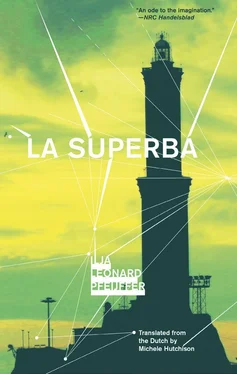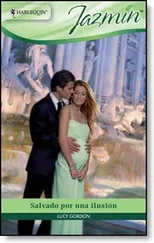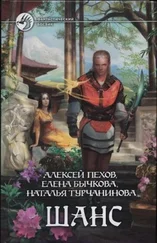The woman had arrived within half an hour, and half an hour later she’d mopped everything up. Monia was already asleep by then. “Sorry,” I said to the cleaner.
“I never say sorry to anybody,” she said. “Life is as life does.”
“How much do I owe you? I hired you to do the job, after all. How much does Monia pay you?”
“Nothing.”
“What do you mean?”
“You might have thought you’d found yourself a rich, older mistress. I know your type. You’re an artist, aren’t you? We have to work for our money. But I won’t hold it against you, don’t get me wrong. But she isn’t rich. And she’s not your mistress anymore, if I can give you one piece of good advice, though it’s probably no longer necessary. Goodbye.”
“Oi, oi,” the neighbor said. He prayed to a few more saints, then he, too, figured it was time to go home.
26.
She came and sat down opposite me, uninvited — Fulvia, the witch — and said this: “I’ve been hearing a lot of things about you recently, Leonardo. My grandmother always said, ‘Leave the wheat growing when it’s growing and break glasses in November.’ My grandmother was a wise woman, she knew things people today have forgotten. I don’t blame them. In every lunar cycle in history you see the same shifts. It goes from Venus to Mars and vice versa. That’s how it progresses from the Major to the Minor Arcana.” She smiled omnisciently. “The magnetic field under this city was designed many cycles ago as a kind of blueprint for the new era. But we have to interpret it ourselves, a lot of people forget that. We have to learn to think in meridians. From north to south. Like lines on a hand. Let me see your hand. No, your left hand. You see. Do you know what I can see? If you don’t die of illness or an accident, you’ll live a long life.”
Naturally, I was happy with this news. But I kept wondering whether there were any other causes of death aside from illnesses and accidents. Old age perhaps?
“Thanks.” I thought about the different ways a man could die. A tortoise fell on Aeschylus’ head. But that falls into the accidents category. And apart from accidents or illness, what’s left? Murder?
“You mustn’t be so negative, Leonardo. That karma will turn against you. The earth goddess only embraces those who see the pendulum move.” She smiled triumphantly.
“Lay down some cards,” I said.
“That’s not how it works, Leonardo.”
“How does it work, then?”
She smiled. Alright. I got it. I went inside to order her a dry martini cocktail.
She smiled. That was how it worked. She began to lay the cards on the table.
“These are all the things you already know.”
“What then?”
“You’re from Germany.”
“Holland.”
“You’re a painter.”
“Writer.”
“Exactly, but your mother worries about you.”
“Why?”
“Because you’re at a spiritual stage in your life where you listen to fairies not elves.”
“What does that mean?”
“Don’t interrupt. I’m just beginning to make contact with your spiritual underbelly. No, really, there’s a lot of resonance there. Do you know what, Leonardo, tell me honestly — do you have that thing that sometimes you feel really good and sometimes you feel really bad and sometimes in the middle? Yes? I can feel it. I understand it.”
She lay a few more cards. As she did this, she made a dismissive gesture. That upside down king of swords in combination with the fool didn’t tell her anything new. In fact, that’s what she’d been trying to tell me the whole time.
“What?”
That I was a man who lived with my heart but also with my head. I was a sensitive person but intelligent, too, unfortunately. I liked love but I also needed my own space. I was strange and typical at the same time. Although I thought I’d found something, I was searching. Although I thought I understood something, I was questioning. Although I thought I could deny the truth of the cards, my future was extremely uncertain.
She laid three more cards. The king of cups, a scythe cutting hay, and an upside down seven of wands.
“Look,” she said. “On the basis of these three cards, what would you conclude about my opinion of you?”
“You despise me.”
“That’s pretty much the first time you’ve said anything truthful.”
“But your pebble-dash opinion is uninformed and will turn against you like the tides against the position of the moon and the rocks against the sea during the equinox.”
I was tired of her. I stopped talking.
“You don’t understand a thing, Leonardo. Write that down in your little book.”
“Ach.”
“What, ach?”
“What, ach? What do you want to know? What’s your name again? Fulvia. I find you — thank you for having the courage to ask me — a thoroughly reprehensible person.”
“Could you explain that, Leonardo?”
“Yes.” I went inside to pay for everything, both my drinks and hers, as well as everyone who had sat at her table before me. I put the receipt in my back pocket. Then I ordered another bottle of Prosecco in an ice bucket. I paid for that, too. I took the order to her table personally, took the bottle from the ice bucket, put it on the table and said, “Fulvia, do you know what my grandmother always said? ‘You have to keep a cool head.’ My grandmother was a wise woman.”
27.
I didn’t know exactly what he knew or how he had found me, but he knew things and he’d been able to find me. I don’t know his real name, but everyone called him Il Varese. That was how he introduced himself to me. I’d seen him before, only I couldn’t remember where. He turned out to be the exclusive brewer of Bryton, an authentic Ligurian beer that was undrinkable, but brewed using a method based on well documented archeological findings. Yeah, well, exactly. That was what it tasted like, too. He was a large, broad, fat man who looked like a beer drinker, like someone who sweated and stank and pissed liters of clear piss out of his shriveled fire hose that hung under a massive belly that blocked all view of what, in his wet dreams, was still the instrument of his futile ambition. Misery led him to try to become a successful businessman instead, in the hope that supplicating nymphets might be prepared to suckle on his sorry little pee-pee on the basis of his commercial success. But it hadn’t completely worked, that ingenious master plan, and he didn’t really know what exactly had gone wrong, either. Somewhere on the way to becoming rich and famous, he’d missed both boats. Since then, sighing with arrogance and condescension, he’d been permanently clamped to his mobile phone filled with important contacts who for incomprehensible reasons kept failing to call him the whole time. But he wasn’t going to give up. After all, he could still sell his own beer. He called Berlusconi on his private number in Portofino, but for some unknown reason he didn’t pick up. That was definitely the work of the communists. They had special gadgets to prevent honest businessmen from doing business with honest politicians who understood that the country needed honest businessmen. What Italy needed was modern entrepreneurship, of which he himself was a shining example. An archeologist finds a few traces of scummy beer in an earthenware pot almost two thousand years old and sees a business opportunity. That was his skill. That was his genius. With a sigh, he scratched his musty crotch again.
Perhaps I’m not describing him with complete objectivity, I know, but I simply don’t like the man. He rudely sat down opposite me.
“So,” he said.
And suddenly I knew where I’d seen him before. Right here, on the Bar of Mirrors’ terrace. I’d even written about him, I think. Sometime early on. When I’d just arrived in Genoa and was happy and naive, when I described how an Italian greeted another man he clearly had arranged to meet. That was him. But don’t look it up, it’s not important.
Читать дальше












